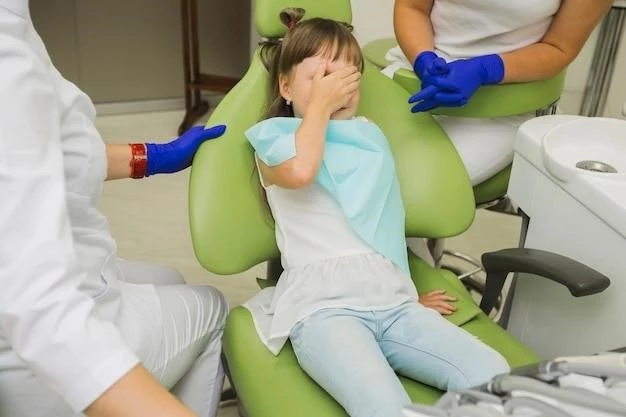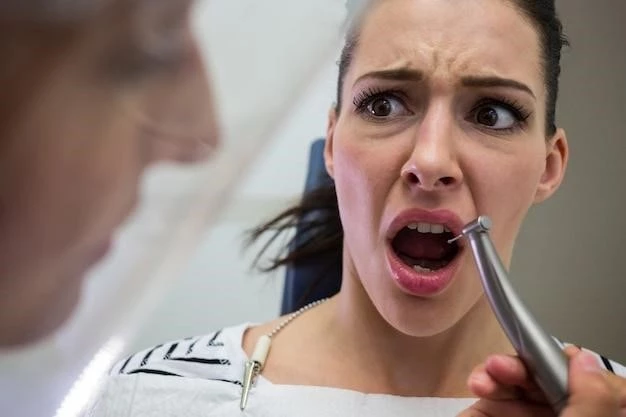Disease ー Dentophobia
Having a fear of dentists can be daunting, but understanding dentophobia is the first step to overcoming it․ Learn about the causes, symptoms, effects, and ways to manage dental anxiety to help you navigate through your fear of dental procedures․
Understanding Dentophobia
Dentophobia, also known as dental fear or dental phobia, is a common anxiety disorder that affects many individuals․ It is characterized by an intense fear of dentists, dental visits, and dental treatment․ This phobia can be triggered by various factors such as past traumatic dental experiences, fear of pain, feeling of lack of control, or embarrassment about the condition of one’s teeth․
Individuals with dentophobia may experience symptoms like palpitations, sweating, trembling, or even panic attacks when faced with the prospect of a dental appointment․ The effects of dentophobia can lead to poor oral health, avoidance of necessary dental care, and worsening dental problems over time․
Understanding dentophobia involves recognizing that the fear is valid and seeking support to address it․ It’s essential to communicate openly with your dentist about your anxiety and work together to create a comfortable environment during dental visits․ Educate yourself about dental procedures, practice relaxation techniques, and consider therapy or sedation options if needed․
By acknowledging and understanding your dentophobia, you can take proactive steps to overcome it and maintain good oral health․ Remember that you are not alone in facing dental anxiety, and there are resources available to help you manage your fear of dentists and dental procedures․
Causes of Dentophobia
The causes of dentophobia, or fear of dentists, can vary from person to person․ Common triggers include negative past dental experiences, such as pain or feeling judged by a dentist․ Fear of needles, drills, or the dental setting itself can also contribute to dental anxiety․
Other factors that may lead to dentophobia include a sense of loss of control during dental procedures, embarrassment about oral health, or even the fear of potential financial costs associated with dental treatments․ Media portrayal of dentistry, stories from others, or cultural beliefs can also influence a person’s fear of dental visits․
For some individuals, underlying anxiety disorders or phobias can exacerbate their fear of dental procedures․ Traumatic experiences in other aspects of life may also contribute to the development of dentophobia․ Understanding the specific triggers that cause your dental fear is crucial in addressing and overcoming dentophobia․

To manage your fear of dentists, consider discussing your concerns with a mental health professional or a dentist who specializes in treating patients with dental anxiety․ They can help you identify the root causes of your dentophobia and develop coping strategies to make dental visits more bearable․ Remember that it’s okay to seek support and take steps towards overcoming your fear of dental treatment․
Symptoms and Effects of Dentophobia
Individuals experiencing dentophobia may exhibit a range of symptoms, both physical and emotional, when faced with the prospect of dental appointments․ These symptoms can include increased heart rate, sweating, trembling, feelings of dread, and difficulty breathing․ Some may even have panic attacks or experience gastrointestinal distress․
The effects of dentophobia can extend beyond just the fear itself․ Avoiding dental visits due to fear can lead to deteriorating oral health, as preventive care and necessary treatments are postponed or neglected․ Untreated dental issues may worsen over time, causing more significant problems and potentially leading to more invasive and costly procedures in the future․
Emotionally, dentophobia can take a toll on an individual’s mental well-being, leading to increased stress, anxiety, and a sense of helplessness․ The fear of dental procedures can affect daily life and quality of life, as the anticipation of a dental appointment can cause significant distress and preoccupation․
Recognizing the symptoms and effects of dentophobia is the first step towards addressing and managing this fear․ Seeking professional help, such as therapy or counseling, can assist individuals in developing coping mechanisms to alleviate anxiety and navigate through dental visits with greater ease․ Remember that taking care of your oral health is essential, and overcoming dentophobia is possible with the right support and strategies․
Overcoming Dentophobia
Overcoming dentophobia, or the fear of dental procedures, is possible with the right approach and support․ Start by acknowledging your fear and accepting that it is valid․ Open communication with your dentist is essential – share your concerns, ask questions, and work together to create a comfortable treatment plan․
Gradual exposure to dental settings and procedures can help desensitize you to the fear over time․ Consider visiting the dental office without an appointment, meeting the staff, and familiarizing yourself with the surroundings․ Develop relaxation techniques such as deep breathing, visualization, or listening to calming music to manage anxiety during visits․
Seeking therapy or counseling can provide you with coping strategies and tools to address the root causes of your dentophobia․ Cognitive-behavioral therapy, exposure therapy, and relaxation techniques are common approaches used to overcome dental fear․ In some cases, dentists may recommend sedation options to help you feel more at ease during treatments․
Building a trusting relationship with your dentist and dental team is crucial in overcoming dentophobia․ Remember that you are in control of your dental care, and it’s okay to express your fears and preferences․ Celebrate small victories and progress made towards managing your fear of dental visits․ With patience, perseverance, and support, you can conquer dentophobia and maintain good oral health․
Professional Help for Dentophobia
Seeking professional help for dentophobia is a proactive step towards managing your fear of dentists and dental procedures․ Consulting with a psychologist, therapist, or counselor who specializes in treating dental anxiety can provide you with valuable support and guidance to overcome your fear․
Cognitive-behavioral therapy (CBT) is a common approach used to address dentophobia․ Through CBT, you can learn to identify and challenge negative thought patterns that contribute to your fear of dentists․ This therapy can also help you develop coping strategies, relaxation techniques, and desensitization exercises to gradually reduce anxiety related to dental visits․
For individuals with severe dentophobia, dentists may offer sedation options to help alleviate anxiety during treatments․ Sedation dentistry can range from oral sedatives and nitrous oxide to intravenous sedation, depending on the level of fear and the complexity of the dental procedure․
Your dentist may also recommend dental professionals who specialize in treating patients with dental anxiety․ These professionals are trained to create a supportive and calming environment for individuals with dentophobia, helping them feel more comfortable and at ease during dental visits․
Remember that professional help is available to assist you in managing your dentophobia effectively․ By proactively seeking support from mental health professionals and dental experts, you can work towards overcoming your fear of dentists and dental procedures, ultimately improving your oral health and overall well-being․
Tips for Managing Dental Anxiety
Managing dental anxiety is essential for overcoming dentophobia and ensuring regular dental care․ Start by communicating openly with your dentist about your fears and concerns․ Building a trusting relationship with your dental team can help alleviate anxiety and create a supportive environment during treatments․
Practice relaxation techniques before and during dental visits to help calm your nerves․ Deep breathing exercises, mindfulness meditation, or visualization can help reduce anxiety and promote a sense of calmness․ Listening to music or podcasts during appointments can also distract your mind and ease tension․
Gradual exposure to dental settings can desensitize you to the fear over time․ Consider visiting the dental office without an appointment, sitting in the waiting room, or scheduling brief, non-invasive procedures to build confidence․ Take small steps towards facing your fear and celebrate your achievements along the way․
Educate yourself about dental procedures to demystify the process and alleviate anxiety․ Ask your dentist to explain each step of the treatment beforehand, so you know what to expect․ Knowing what is happening can reduce the fear of the unknown and empower you to feel more in control during dental visits․
Consider bringing a trusted friend or family member to accompany you to dental appointments for emotional support․ Having a familiar face by your side can provide comfort and reassurance during treatments․ Reward yourself after each dental visit, whether with a small treat, a relaxing activity, or a positive affirmation for facing your fears․
